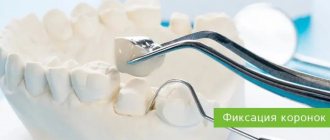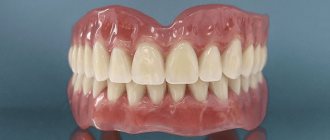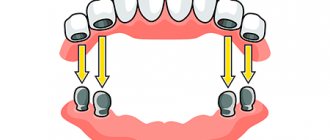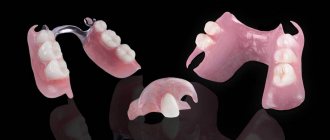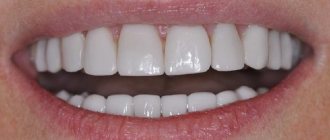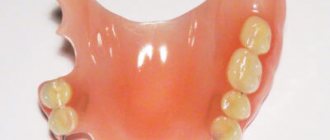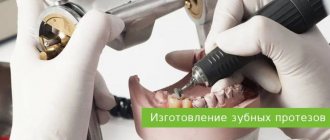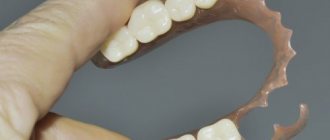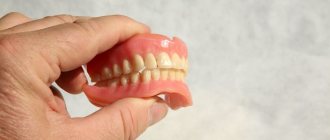In many cases, a denture is a solution to the problem of missing several teeth in a row. At the same time, the choice in prosthetic instruments is so great that patients can afford orthodontic devices of a wide variety of designs, different materials and price categories. As you know, all prosthetic devices are divided into removable and non-removable. The latter are distinguished by a more rigid permanent fixation, but removable dentures become optimal for many, since they allow the dental structure to be removed if necessary.
Even if the removable denture was made from expensive materials by the best specialists (as in the LeaderStom clinic), then even in this case, there may be voids in some places between the prosthetic device and the gum tissue, and abrasions or areas of increased pressure on the gum in others. This fact is not considered a defect or defect of dentists: the fact is that such minimal defects are eliminated themselves during the period of adaptation to the prosthesis, or by using special fixing agents and materials.
Fixing cream
Adhesive (fixing) preparations are available in the form of creams, powders or fiber pads. The most popular among them are creams that are produced on the basis of water-soluble polymer materials. They are easy to use, have additional antiseptic and aromatic properties and allow the patient to completely eliminate defects in the prosthetic device at the same time as more durable fixation. Manufacturers additionally add anti-inflammatory oils to some creams, which have a beneficial effect on the condition of the gums.
The principle of using a fixing cream is quite simple: immediately before applying the cream, you need to thoroughly rinse the prosthetic device and brush your teeth. Then a small amount of fixing cream is applied to the inside of the denture base. The device is placed on the teeth and pressed lightly for five to seven minutes. The adhesive preparation is completely compatible with biological tissues of the oral cavity, its composition is natural and does not cause allergies.
An essential feature that all patients need to be aware of is the condition of healthy gums. Any acute or chronic inflammation of the soft tissues of the oral cavity requires the owner of the prosthesis to temporarily refrain from using the orthodontic device and its fixing agents.
Adverse reactions
The best cream for fixing dentures should not only be effective, but also not give adverse reactions even with long-term use. In case of an overdose of the drug, the following symptoms may occur:
- increased salivation;
- nausea, possible vomiting;
- general malaise;
- allergic reactions.
If you notice such manifestations, immediately visit your dentist: he will help you choose a remedy that will not cause unwanted reactions.
Fixing spacers
This remedy is most often used during the first weeks of wearing a prosthetic structure. Accustoming to a foreign product in the oral cavity occurs differently in different patients. Some experience increased salivation, while others experience discomfort and problems chewing food. Products made of soft fibrous fabric allow you to very carefully fix the prosthesis on the gum. At the same time, they attach well, do not change the bite and protect the gum tissue from rubbing or pressure from the prosthesis. Before applying the fixing gasket, it should be immersed in warm water to wet it. As soon as the product is saturated with water, it can be placed on the inner surface of the prosthesis.
The main indications for using a fixing gasket are:
- significant deformation of the gums as a result of prolonged absence of teeth;
- individual features of the jaw structure;
- atrophic changes in the bone tissue of the upper or lower jaws.
Experts recommend changing retaining pads daily and not neglecting the rules of oral hygiene. It is necessary to regularly clean both the gums and teeth, and the prosthetic device itself. Otherwise, if there are food residues or oil stains on the base of the prosthesis, the gasket will not be fully fixed.
Patients who use this type of prosthesis fixation recognize its obvious advantages:
- protection of the gums from contact with polymer materials of the prosthesis;
- long-lasting and high-quality fixation for 8 hours;
- absence of allergic reactions and irritation of gum tissue;
- effective correction of tissue adhesion during gum deformation;
- antiseptic and aromatic additional effect.
"Fittident" (Austria)
Fittydent is the best denture cream according to most users. Its only drawback is its high cost - about 500 rubles per tube. It has gained great popularity due to its harmless composition (no zinc or dyes), high resistance to liquids, and economical consumption. “Fittident” reliably fixes the removable structure in the mouth for 12 hours – this is more than enough for a day of use.
Fixing powder
It is made from sodium alginate, which contains natural substances that are biologically compatible with living gum tissue. The principle of using the powder is the same as that of a cream or fixing pad. A small amount of fixing powder is applied to the previously cleaned denture, the device is immediately put on the teeth and bonding occurs. Fixing powder, unlike fixing creams or pads, is usually available without aromatic or flavoring additives.
"Rox" (Switzerland)
ROCS (“Rox”) is the best denture cream in terms of cost and quality. It contains special substances that prevent and eliminate the inflammatory process, as well as compounds that maintain the normal balance of beneficial microorganisms in the oral cavity. Another advantage is resistance to high temperatures of consumed foods and liquids. In addition, the product has a low price (on average 250 rubles per tube), ensures stable retention of the prosthesis for 12 hours, and gives freshness to the breath thanks to the mint component. Rox contains no zinc or dyes.
“I was forced to install a removable denture on the upper jaw, I spent a long time looking for some kind of glue, because it was constantly falling out. I tried everything... I settled on Rox. Now I feel confident and comfortable in any situation.” Olga Sergeevna, 58 years old
Recommendations for getting used to a prosthetic device
Dentist specialists from the LeaderStom network of clinics believe that the process of adaptation to a prosthetic device takes on average up to 2 months. The most difficult of them are the first two weeks. During this period, symptoms such as:
- difficulty speaking;
- difficulties with chewing and swallowing, leading to a gag reflex;
- sensation of sore gums or general discomfort from fixing the prosthesis;
- increased salivation.
The advantage of a removable denture is that in case of severe discomfort, the device can always be removed for a short time and rest. At first, it is recommended to wear the prosthetic device not during meals, but in the intervals between meals. The next stage of adaptation will be putting on the prosthesis at night. When the body has already gotten a little used to it, you can move on to fixative drugs.
With increased salivation, sucking candies are very helpful because they stimulate the swallowing reflex. It is recommended to drink plenty of water in small sips to teach the body to swallow with the presence of a prosthetic device.
During the period of adaptation to the prosthesis, you should adhere to a gentle diet and exclude solid foods. Do not worry if the installation of a removable denture has a negative impact on the taste of food. This is a quite common symptom that goes away on its own after two weeks of using the prosthesis and does not depend in any way on the fixation agent.
Difficulties in speaking while wearing a denture are also temporary, but most patients will need to work on it a little. The best way is to read aloud. If you have grandchildren, then bedtime stories will not only be useful for them, but also effective practice for your pronunciation.
In rare cases, wearing a prosthesis causes so-called individual intolerance, when psychological discomfort exceeds physical discomfort. However, such a diagnosis can only be made after 2-3 weeks, when at the physiological level the adaptation of the prosthetic device has been successful, but the patient still continues to experience severe discomfort. In such a situation, you can simply postpone wearing the prosthesis and wait for a more favorable moment. There are many cases where the prosthesis “took root” two to three months after its first installation and fixation.
Glue selection criteria
When choosing the appropriate denture adhesive for his patient, the doctor takes into account the characteristics of the oral cavity and his experience. But no one prevents the patient from choosing the right product for himself. Glue production occurs in three variations:
- liquid;
- medium viscosity;
- viscous.
The liquid composition has a higher consumption. But it is very convenient to use this remedy in the very first stages of wearing dentures. It takes a lot of time to fix the structure, so everything moves to a cream of a more viscous consistency.
Glue is applied to the structure in strips. There should be 3 or 4 of them. After attaching the prosthesis, the glue begins to be evenly distributed. If a person uses a prosthesis for the first time and has not yet gotten used to it, then his perception of taste is distorted. Dentists recommend initially avoiding flavored glue so as not to worsen the situation.
According to the manufacturers of fixing agents, the adhesion duration is 12 or 24 hours. But this time does not imply the influence of other factors, such as food intake, the chemical composition of food and laughter. If we refer to practice, the total duration of wearing a denture using glue is 9 hours. Each manufacturer has its own quality characteristics.
Features of prosthesis care
The presence of a prosthesis-fixing material does not relieve the patient from the procedure of daily cleaning of the dental structure. The effect of adhesive materials is calculated from several hours to one day.
In the morning and evening, the denture should be thoroughly rinsed and cleaned with a special soft brush. Experts recommend not using toothpastes with abrasives when brushing. Even if your denture is made of high-quality ceramic, harsh cleaning particles can damage it with daily use. Remains of fixing cream or powder can be easily removed using regular children's toothpaste. For those who prefer the best protection of their prosthesis from germs and dirt, there are specially designed tablets. They are dissolved in a glass of water where the prosthetic device is placed and left overnight for a cleansing effect.
You don’t have to endure the discomfort of a prosthetic device alone—contact your dentist at the slightest sign of chafing or pain. The prosthetic device itself can be subject to correction, its functional qualities can be adapted individually to the patient. And then the period of adjustment will become easy and pleasant for you, and fixing drugs will help you adapt even faster to your new life with new teeth.
Corega (Ireland)
Cream for dentures Corega (“Corega”), along with positive reviews, has quite a lot of negative ones. Among the advantages are an affordable price (about 250 rubles), economical consumption, and the possibility of use for sensitive gums. Its use does not require preliminary drying of the structure. The negative aspects include the rapid dissolution of the product under the influence of water, which leads to a short period of operation - only 3-4 hours. The same property provokes the entry of the composition into the digestive tract during food intake.
How to restore diction
To restore diction, it is recommended to speak as much as possible: read books, pronounce tongue twisters, while holding one or more sweets in your mouth (without sugar! For example, Sula with mint or sea buckthorn).
15-20 minutes, several times a day. The duration of the course is the first 1.5-2 weeks after prosthetics. Tongue twisters for restoring diction after removable prosthetics
| For your convenience, we have selected several useful tongue twisters |
| The snout pig was white-nosed, blunt-nosed; I dug up half the yard with my snout, dug, dug. |
| Karl stole Klara's advertising, and Klara stole Karl's budget. |
| In Kabardino-Balkaria, valocordin from Bulgaria. |
| The fast talker quickly said quickly, That you can’t quickly talk all the tongue twisters, but you can’t over-speak all the tongue twisters, But, having quickly spoken, he quickly said, That you can’t talk all the tongue twisters, but you can’t over-speak. |
